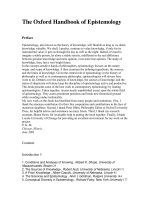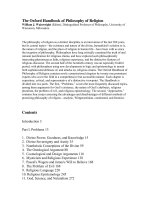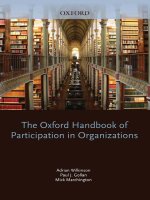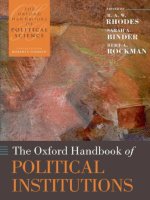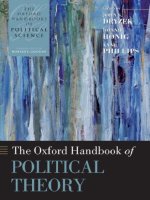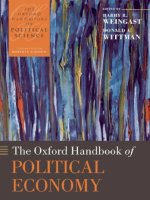- Trang chủ >>
- Khoa Học Tự Nhiên >>
- Vật lý
the oxford handbook of contextual political analysis jun 2006
Bạn đang xem bản rút gọn của tài liệu. Xem và tải ngay bản đầy đủ của tài liệu tại đây (5.71 MB, 882 trang )
the oxford handbook of
CONTEXTUAL
POLITICAL
ANALYSIS
Edited by
ROBERT E. GOODIN
and
CHARLES TILLY
1
the oxford handbook of
CONTEXTUAL
POLITICAL
ANALYSIS
the
oxford
handbooks
of
political
science
General Editor: Robert E. Goodin
The Oxford Handbooks of Political Science is a ten-volume set of reference books
oVering authoritative and engaging critical overv iews of all the main branches of
political science.
The series as a whole is under the General Editorship of Robert E. Goodin, with
each volume being edited by a distinguished international group of specialists in their
respective Welds:
POLITICAL THEORY
John S. Dryzek, Bonnie Honig & Anne Phillips
POLITICAL INSTITUTIONS
R. A. W. Rhodes, Sarah A. Binder & Bert A. Rockman
POLITICAL BEHAVIOR
Russell J. Dalton & Hans-Dieter Klingemann
COMPARATIVE POLITICS
Carles Boix & Susan C. Stokes
LAW & POLITICS
Keith E. Whittington, R. Daniel Kelemen & Gregory A. Caldeira
PUBLIC POLICY
Michael Moran, Martin Rein & Robert E. Goodin
POLITICAL ECONOMY
Barry R. Weingast & Donald A. Wittman
I NT ER N ATI O N AL RE LAT IO NS
Christian Reus-Smit & Duncan Snidal
CONTEXTUAL POLITICAL ANALYSIS
Robert E. Goodin & Charles Tilly
POLITICAL METHODOLOGY
Janet M. Box-Steffensmeier, Henry E. Brady & David Collier
This series aspires to shape the discipline, not just to report on it. Like the Goodin–
Klingemann New Handbook of Political Science upon which the series builds, each of
these volumes will combine critical commentaries on where the Weld has been
together with positive suggestions as to where it ought to be heading.
3
Great Clarendon Street, Oxford ox2 6dp
Oxford University Press is a department of the University of Oxford.
It furthers the University’s objective of excellence in research, scholarship,
and education by publishing worldwide in
Oxford New York
Auckland Cape Town Dar es Salaam Hong Kong Karachi
Kuala Lumpur Madrid Melbourne Mexico City Nairobi
New Delhi Shanghai Taipei Toronto
With oYces in
Argentina Austria Brazil Chile Czech Republic France Greece
Guatemala Hungary Italy Japan Poland Portugal Singapore
South Korea Switzerland Thailand Turkey Ukraine Vietnam
Oxford is a registered trade mark of Oxford University Press
in the UK and in certain other countries
Published in the United States
by Oxford University Press Inc., New York
ß the several contributors 2006
The moral rights of the author have been asserted
Database right Oxford University Press (maker)
First published 2006
All rights reserved. No part of this publication may be reproduced,
stored in a retrieval system, or transmitted, in any form or by any means,
without the prior permission in writing of Oxford University Press,
or as expressly permitted by law, or under terms agreed with the appropriate
reprographics rights organization. Enquiries concerning reproduction
outside the scope of the above should be sent to the Rights Department,
Oxford University Press, at the address above
You must not circulate this book in any other binding or cover
and you must impose the same condition on any acquirer
British Library Cataloguing in Publication Data
Data available
Library of Congress Cataloguing in Publication Data
Data available
Typeset by SPI Publisher Services, Pondicherry, India
Printed in Great Britain
on acid-free paper by
Biddles Ltd., King’s Lynn, Norfolk
ISBN 0–19–927043–0 978–0–19–927043–9
13579108642
Contents
About the Contributors
PART I INTRODUCTION
1. It Depends 3
Charles Tilly & Robert E. Goodin
PA R T I I P H I L O S O PH Y M AT TER S
2. Why and How Philosophy Matters 35
Philip Pettit
3. The Socialization of Epistemology 58
Louise Antony
4. Political Ontology 78
Colin Hay
5. Mind, Will, and Choice 97
James N. Druckman & Arthur Lupia
6. Theory, Fact, and Logic 114
Rod Aya
PART III PSYCHOLOGY MATTERS
7. Why and How Psychology Matters 131
Kathleen M. McGraw
8. Motivation and Emotion 157
James M. Jasper
9. Social Preferences, Homo Economicus, and Zoon Politikon 172
Samuel Bowles & Herbert Gintis
10. Frames and Their Consequences 187
Francesca Polletta & M. Kai Ho
11. Memory, Individual and Collective 210
Aleida Assmann
PA R T I V I D E AS MATT ER
12. Why and How Ideas Matter 227
Dietrich Rueschemeyer
13. Detecting Ideas and Their EVects 252
Richard Price
14. How Previous Ideas AVect Later Ideas 266
Neta C. Crawford
15. How Ideas AVect Actions 284
Jennifer L. Hochschild
16. Mistaken Ideas and Their EVects 297
Lee Clarke
PART V CULTURE MATTERS
17. Why and How Culture Matters 319
Michael Thompson, Marco Verweij &
Richard J. Ellis
18. How to Detect Culture and Its EVects 341
Pamela Ballinger
19. Race, Ethnicity, Religion 360
Courtney Jung
20. Language, Its Stakes, and Its EVects 376
Susan Gal
21. The Idea of Political Culture 392
Paul Lichterman & Daniel Cefa
I
¨
PART VI HISTORY MATTERS
22. Why and How History Matters 417
Charles Tilly
vi contents
23. Historical Knowledge and Evidence 438
Roberto Franzosi
24. Historical Context and Path Dependence 454
James Mahoney & Daniel Schensul
25. Does History Repeat? 472
Ruth Berins Collier & Sebasti
´
A
n Mazzuca
26. The Present as History 490
Patrick Thaddeus Jackson
PA R T V I I P L A C E M ATT ERS
27. Why and How Place Matters 509
G
¨
O
ran Therborn
28. Detecting the SigniWcance of Place 534
R. Bin Wong
29. Space, Place, and Time 547
Nigel J. Thrift
30. Spaces and Places as Sites and Objects of Politics 564
Javier Auyero
31. Uses of Local Knowledge 579
Don Kalb
PART VIII POPULATION MATTERS
32. Why and How Population Matters 597
David Levine
33. The Politics of Demography 619
Bruce Curtis
34. Politics and Mass Immigration 636
Gary P. Freeman
35. Population Change, Urbanization, and Political Consolidation 649
Jeffrey Herbst
36. Population Composition as an Object of Political Struggle 664
David I. Kertzer & D ominique Arel
contents vii
PA R T I X T E C H NO L O G Y MAT TER S
37. Why and How Technology Matters 681
Wiebe E. Bijker
38. The Gender Politics of Technology 707
Judy Wajcman
39. Military Technologies and Politics 722
Wim A. Smit
40. Technology as a Site and Object of Politics 745
Sheila Jasanoff
PA R T X O L D AND NE W
41. Duchamp’s Urinal: Who Says What’s Rational When
Things Get Tough? 767
David E. Apter
42. The Behavioral Revolution and the Remaking of
Comparative Politics 797
Lucian Pye
Index 806
viii contents
About the Contributors
Louise Antony is Professor of Philosophy at the University of Massachusetts,
Amherst.
David E. Apter is Henry J. Heinz II Professor of Political and Social Development
Emeritus and Senior Research Scholar at Yale University.
Dominique Arel is Associate Professor in the School of Political Studies at the
University of Ottawa.
Aleida Assmann is Professor of English in the Fachbereich Literaturwissenschaft of
the Universit y of Konstanz.
Javier Auyero is Associate Professor of Sociology at the State University of New
York, Stony Brook.
Rod Aya is Assistant Professor of Anthropology at the University of Amsterdam.
Pamela Ballinger is Associate Professor of Anthropology at Bowdoin College.
Wiebe E. Bijker is Professor of Technology and Society at the University of
Maastricht.
Samuel Bowles is Research Professor and Director of the Behavioral Sciences
Program of the Santa Fe Institute and Professor of Economics at the University
of Siena.
Daniel Cefaı
¨
is Associate Professor of Sociology at the University of Paris X—
Nanterre and Researcher at the Institut Marcel Mauss, Ecole des Hautes Etudes en
Sciences Sociales.
Lee Clarke is Professor of Sociology at Rutgers University.
Ruth Berins Collier is Professor of Political Science at the University of California,
Berkeley.
Neta C. Crawford is Professor of Political Science and African American Studies at
Boston University and Adjunct Professor of International Relations at the Watson
Institute for International Studies at Brown University.
Bruce Curtis is Professor of Sociology and Anthropology at Carleton University.
James N. Druckman is Associate Professor of Political Science at Northwestern
University.
Richard J. Ellis is Mark O. HatWeld Professor of Politics at Willamette University.
Roberto Franzosi is Professor of Sociology at the University of Reading.
Gary P. Freeman is Professor of Government at the University of Texas at Austin.
Susan Gal is Mae and Sidney G. Metzl Distinguished Service Professor of Anthro-
pology and Linguistics at the University of Chicago.
Herbert Gintis is a member of the External Faculty of the Santa Fe Institute, and
Professor, Central European University.
Robert E. Goodin is Distinguished Professor of Social & Political Theor y and
Philosophy at the Research School of Social Sciences, Australian National Univer-
sity.
Colin Hay is Professor of Political Analysis at the University of Birmingham.
JeVrey Her bst is Provost, Miami University.
M. Kai Ho is a Ph.D. candidate in Sociology at Columbia University.
Jennifer L. Hochschild is Henry LaBarre Jayne Professor of Government and
Professor of African and African American Studies at Harvard University.
Patrick Thaddeus Jackson is Assistant Professor of International Relations in the
School of International Service at American University.
Sheila JasanoV is Pforzheimer Professor of Science and Technology Studies at the
John F. Kennedy School of Government, Harvard University.
James M. Jasper having previously taught at Berkeley, Columbia, Princeton and
New York University now edits Contexts magazine.
Courtney Jung is Assistant Professor in the Department of Political Science at The
New School for Social Research.
Don Kalb is Associate Professor of Sociology and Social Anthropology at the
Central European University, Budapest, and researcher in the Department of
Anthropology, Utrecht University.
David I. Kertzer is Paul Dupee, Jr. University Professor of Social Science and
Professor of Anthropology and Italian Studies at Brown University.
David Levine is Professor of Theory and Policy Studies at the Ontario Institute for
Studies in Education, University of Toronto.
x about the contributors
Paul Lichterman is Associate Professor of Sociology at University of Southern
California and Associate Professor (on leave) at the University of Wisconsin-
Madison.
Arthur Lupia is Professor of Political Science and Senior Research Scientist at the
Center for Political Studies of the University of Michigan.
James Mahoney is Associate Professor of Political Science and Sociology at North-
western Universit y.
Sebastia
´
n Mazzuca is a Ph.D. candidate in Political Science at the University of
California, Berkeley.
Kathleen M. McGraw is Professor of Political Science at Ohio State University.
Philip Pettit is L. S. Rockefeller University Professor of Politics and Human Values
at Princeton University.
Francesca Polletta is Associate Professor of Sociology at Columbia University.
Richard Price is Associate Professor of Political Science at the University of British
Columbia.
Lucian Pye is Emeritus Professor of Political Science at MIT.
Dietrich Rueschemeyer is Charles C. Tillinghast Jr. Professor of International
Studies, Emertius, Waston Institute for International Studies, Brown University.
Daniel Schensul is a Ph.D. candidate in Sociology at Brown University.
Wim A. Smit is Associate Professor of Science, Technology and Society and
Director of the Centre for Studies on Science, Technology and Society at the
University of Twente.
Go
¨
ran Therborn is a Director of the Swedish Collegium for Advanced Study in the
Social Sciences at Uppsala.
Michael Thompson is Visiting Fellow at the James Martin Institute for Science and
Civilization at the University of Oxford; Senior Researcher at the Stein Rokkan
Centre, University of Bergen; and Institute Scholar at the International Institute for
Applied Systems Analysis, Laxenburg, Austria.
Nigel J. Thrift is Professor of Geography and Pro-Vice-Chancellor (Research) at
Oxford University.
Charles Tilly is Joseph L. Buttenwieser Professor of Social Science at Columbia
University.
Marco Verweij is Associate Professor of Political Science at the Singapore Manage-
ment University.
about the contributors xi
Judy Wajcman is Professor of Sociology in the Research School of Social Sciences,
Australian National Universit y.
R. Bin Wong is Professor of History and Director of the Asia Institute at UCLA.
xii about the contributors
part i
INTRODUCTION
chapter 1
IT DEPENDS
charles tilly
robert e. goodin
1 Overture
Cast of characters:
.
Sivu, pseudonym for a peasant in Aurel Vlaicu (Vlaicu for short), a Transylvanian
village of about 820 people living in 274 houses
.
Agron, the local land commission’s agronomist
.
Map, the land commission’s surveyor
.
Com’t, a member of the land commission from Vlaicu
.
Katherine Verdery, American anthropologist and long-time observer of life in
Vlaicu
Time: Spring 1994.
In 1994, the Romanian government and the people of Vlaicu faced a knotty
problem: how to privatize the village collective farm set up under Romania’s state
socialism. Before socialism, Vlaicu had maintained its own form of private prop-
erty with some collective controls over land, animals, and agricultural products.
That system lasted until the Russian takeover of 1945. Between then and 1959,
however, Romania’s socialist authorities went from organizing cooperatives to
coercing collectivization; they created both a state farm and a collective farm. In
contrast to the government-owned and centrally managed state farm, Vlaicu’s
households acquired provisional shares of the collective farm’s lands, on condition
of using its facilities and producing their quotas of its crops.
Over the thirty years between 1959 and the collapse of Romanian socialism in
1989, numerous villagers whose families had previously held land left for city jobs,
families that stayed in the village waxed or waned, and shares in the collective farm
shifted accordingly. As the old regime collapsed, villagers often claimed the land
they were then working, sold it, shared it w ith other family members, or passed it
on to heirs. In 1994, then, the land commission had to decide which rights, whose
rights, and as of what date, established claims to the land now being privatized.
Hence the drama, as recorded in Verdery’s Weld notes:
Sivu comes in and is very noisy about what terrible things he’s going to do if his case isn’t
settled. He has a piece in Filigore, claims it must be measured, Map says it already has
been—they repeat this several times. Map gets mad because people want remeasuring:
‘‘We’ll never Wnish this job if people make us remeasure all the time!’’ One woman wants
him to go measure in Lunca; he says, ‘‘We already did it there, if we have to go back we won’t
get out for two weeks.’’ Sivu says loudly, ‘‘I don’t want anything except what’s mine!’’ He
accosts Com’t: ‘‘Look into my eyes, you’re my godfather, I’m not asking for anything except
what’s mine. I bought it from Gheorghe, it’s next to Ana and to Constantin. If you don’t give
it to me, I’ll . . . I’ll do what no one’s done in all of Vlaicu.’’ (Verdery 2003, 117)
The village drama enacts politics as most ordinary people experience politics most
of the time: not as grand clashes of political theories or institutions, but as local
struggle for rights, redress, protection, and advantage in relation to local oYcials.
Here, as elsewhere, how political processes actually work and what outcomes they
produce depend heavily on the contexts in which they occur.
Property Wgured centrally in the Vlaicu drama, but not as the abstract property
of constitutions and treatises. Sivu bought Gheorghe’s plot, which neighbored
those of Ana and Constantin; he wanted the authorities to record and legitimate
his right to exactly that piece of land. He insisted that the surveyor and the
agronomist set down the land’s boundaries so that Ana and Constantin (who
may well have been encroaching on Gheorghe’s parcel as they plowed) would
recognize where their Welds ended and his began. Looking on, professional political
analysts witness an encounter about which they often theorize: between state-
deWned rights and obligations, on one side, and local social relations, on the other.
Political analysts are not, however, simply observing the clash of two discordant
principles; they are watching the continuous creation and re-creation of rights
through struggle. As Verdery (2003, 19) puts it, ‘‘I have proposed treating property
as simultaneously a cultural system, a set of social relations, and an organization of
power. They all come together in social processes.’’ Verdery reports that in
reckoning rights to collectivized property the Romanian government adopted a
4 charles tilly & robert e. goodin
formal, genealogical conception of rights in land, ignoring who had actually
worked various plots under socialism, who had invested care in older former
proprietors, and so on. From the government’s perspective, any individuals who
occupied similar positions within the genealogy—two brothers, two cousins, two
aunts—had equal rights to shares in privatizing property over which a household
or kin group had a legal claim. That formalistic reasoning clashed with local moral
codes. According to Verdery:
Villagers, however, had not understood kinship that way; for them, it was performative. To
be kin meant behaving like kin. It meant cooperating to create marriage, baptismal and
death rituals; putting Xowers on relatives’ graves; helping out with money or other favors;
and caring for the elderly (who might not even be one’s parents) in exchange for inheriting
their land. (Verdery 2003, 165)
When Sivu demanded what was rightfully his, he appealed to his godfather, the
local commissioner, for conWrmation of his rights. He was calling on a diVerent
code from the one w ritten into Romanian national law.
In the case at hand, Verdery found that—to the dismay of most villagers—the
actual distribution of privatized land reproduced the local hierarchy prevailing at
the terminus of the socialist regime. The pyramid of land ownership ended up
‘‘with state farm directors at the top, collective farm staV below them, and village
households at the bottom, holding very few resources for surviving in the new
environment’’ (Verdery 2003, 11 ). As happened widely elsewhere in the collapse of
state socialist regimes, people used their knowledge of the expiring system to
capture their pieces of what remained (Solnick 1998). That fact oVered tremendous
advantages to people who had already been running factories, bureaucracies,
security services, or state farms under socialism. But ordinary peasants also used
memories, connections, arguments and threats as best they could.
2 Context Matters
Note the immediate importance of context. No one who imagined that privatization
simply followed the laws of the market—or of the jungle—could describe or explain
what actually happened: Through incessant negotiation, resources that had existed (or
had come into being) under governmental control became private property. The
negotiation, the character of the contested resources, the privatization process, Ver-
dery’s collection of evidence on all three, and our own capacity to describe and explain
what was going on in Vlaicu at the time all depend on local and national context.
it depends 5
The context immediately in question here consisted chieXy of previously estab-
lished relations between villagers and a variety of state oYcials. But as we step back
from Vlaicu’s local disputes toward the more general problem of relations between
political power and property at large, we begin to see the relevance of other
contexts: historical, institutional, cultural, demographic, technological, psycho-
logical, ideological, ontological, and epistemological. We cannot dismiss the ques-
tion ‘‘What is property?’’ with Pierre-Joseph Proudhon’s famous reply: ‘‘Property is
theft.’’ As analysts of political processes, we have no choice: we must place rights to
resources in context.
Property obviously does not stand alone in this regard. Political scientists’
inquiries into democratization and de-democratization, civil and international
war, revolution and rebellion, nationalism, ethnic mobilization, political participa-
tion, parliamentary behavior, and eVective government all raise contextual ques-
tions: when, where, in what settings, on what premises, with what understandings of
the processes under investigation? Viable answers to questions of this sort require
serious attention to the contexts in which the crucial political processes operate.
This handbook provides a survey of relevant contexts. Against the most reductive
versions of parsimony, it argues that attention to context does not clutter the
description and explanation of political processes, but, on the contrary, promotes
systematic knowledge. Against the most exaggerated versions of postmodernism, it
argues that context and contextual eVects lend themselves to systematic description
and explanation, hence their proper understanding facilitates discovery of true
regularities in political processes. Between those extreme positions, it examines the
multiple ways in which context aVects analysts’ understanding of political pro-
cesses, the extent and sort of evidence available concerning political processes, and
the very operation of political processes. In our brief introduction to the hand-
book’s varied discussions of these issues, we concentrate on showing the import-
ance for systematic political knowledge of getting context right.
Here is another way of putting our main point: In response to each big question
of political science, we reply ‘‘It depends.’’ Valid answers depend on the context in
which the political processes under study occur. Valid answers depend triply on
context, with regard to understandings built into the questions, with regard to the
evidence available for answering the questions, and with regard to the actual
operation of the political processes. We take this position not as a counsel of
despair, but as a beacon of hope. We pursue the hope that political processes
depend on context in ways that are themselves susceptible to systematic exploration
and elaboration.
The hope applies both to description and to explanation. On the side of descrip-
tion, political scientists make signiWcant contributions to knowledge simply by
getting things right—developing reliable means of identifying the major actors in
political conXicts, clarifying where and when diVerent sorts of electoral systems
succeed or fail, verifying the factual premises of governmental doctrines, and so on.
6 charles tilly & robert e. goodin
On the side of explanation, superior cause–eVect accounts of political processes not
only serve the advance of political science as a discipline but also permit more
accurate forecasts of the eVects likely to result from a given political intervention.
Better description and explanation improve both theory and practice.
We have therefore organized the handbook to show how and why a variety of
contexts matter to systematic description and explanation of political processes.
The contexts that we and our contributors examine range from abstractly philo-
sophical to concretely local. Together they allow us to distinguish three classes of
contextual eVects:
1. On analysts’ understanding of political processes.
2. On the evidence available for empirical examination of political processes.
3. On the processes themselves.
Thus an analyst’s understanding of electoral campaigns derives in part from the
analyst’s own involvement or lack of involvement in electoral campaigns, evidence
concerning electoral campaigns comes in part from campaign participants’ public
declarations of who they are, and electoral campaigns vary signiWcantly in form as a
function of their locations in time and space. To be sure, the three interact:
participant observation of electoral campaigns not only shapes the analyst’s under-
standing and gives the analyst access to certain sorts of evidence other analysts can
rarely acquire, but also makes the analyst a cause, however slight, of what actually
happens in the election. Nevertheless, we will do well to maintain broad distinc-
tions among the three kinds of contextual eVects. The chapters that follow typically
deal with one or two of them, but not all three at once.
2.1 Alternative Approaches
Although any thinking political analyst makes some allowances for context, two
extreme positions on context have received surprisingly respectful attention from
political scientists during recent decades: the search for general laws, and postmod-
ern skepticism.
The Search for General Laws. On one side, we have context as noise, as interfer-
ence in transmission of the signal we are searching for. In that view, we must clear
away the eVects of context in order to discover the true regularities in political
processes. In a spirited, inXuential, and deftly conciliatory synthesis of quantitative
and qualitative approaches to social science, Gary King, Robert Keohane, and
Sidney Verba begin by making multiple concessions to complexity and interpret-
ation, but end up arguing that the Wnal test for good social science is its identiWca-
tion of casual eVects, deWned as:
it depends 7
the diVerence between the systematic component of observations made when the
explanatory variable takes one value and the systematic component of comparable
observations when the explanatory variable takes on another value. (King, Keohane, and
Verba 1994, 82)
This seemingly bland claim turns out to be the thin edge of the wedge, the camel’s
nose under the tent, or the elephant in the room—choose your metaphor! It
initiates a remarkable series of moves including the assimilation of scientiWc
inference to the world-view contained in statistics based on the general linear
model, assumption that the fundamental causes of political processes do, indeed,
consist of variables, consequent rejection of mechanisms as causes, and advice for
making small-N studies look more like large-N studies, all of which commit the
authors more Wrmly to explanation as the identiWcation of general laws that
encompass particular cases.
Postmodern Skepticism. On the other side, we have context as the very object of
political analysis,the complex, elusivephenomenonwe mustinterpret asbest wecan.
In this second view, the Wrst view’s ‘‘regularities’’ become illusions experienced by
political interpreters who have not yet realized that systematic knowledge is impos-
sible and that they only think otherwise because they have fallen victim to their own
immersion in a particular context. Anthropologist CliVord Geertz has written some
of the most eloquent and inXuential statements of the view; indeed, King, Keohane,
and Verba (1994, 38–40) quote Geertz’s ideas as an often-cited but even more often
misunderstood objection to their own approach. Here is Geertz on how law works:
Law, I have been saying, somewhat against the pretensions encoded in woolsack rhetoric, is
local knowledge; local not just as to place, time, class and variety of issue, but as to accent—
vernacular characterizations of what happens connected to vernacular imaginings of what
can. It is this complex of characterizations and imaginings, stories about events cast in
imagery about principles, that I have been calling a legal sensibility. This is doubtless more
than a little vague, but as Wittgenstein, the patron saint of what is going on here, remarked, a
veridical picture of an indistinct object is not after all a clear one but an indistinct one. Better
to paint the sea like Turner than attempt to make of it a Constable cow. (Geertz 1983, 215)
Much more fun than the ‘‘systematic component of comparable observations,’’
Geertz’s argument comes close to saying that the systematic component does not
exist, and would not be worth looking for if it did. Like the King–Keohane–Verba
manual, this handbook came into existence largely because political analysts
steeped in Geertzian skepticism have oVered serious objections to standard social
scientiWc portrayals of political processes, but have not—sometimes on principle—
systematized their knowledge of context, cultural variability, and social construc-
tion (Hacking 1999). It ends up, however, much more concerned about those
objections than King, Keohane, and Verba.
8 charles tilly & robert e. goodin
Something in Between. Political scientists rarely line up in disciplined armies
under the banners of General Laws and Skepticism to do open battle with each
other. Yet the two Xags deWne the limits of a terrain across which political analysts
regularly deploy their forces. From diVering bases within the terrain, polemicists
often venture out for struggle to control one piece or another of the territory.
Some observers speak of choices between positivism and constructivism, between
covering laws and hermeneutics, between general and local knowledge, or
between reductionism and holism. Regardless of the terminology, at one end
of the range we Wnd claims for universal principles that cut across particular
social contexts, at the other claims that attempts to describe and explain political
phenomena have no means of escaping particular social contexts.
Certainly limiting cases exist in which each approach applies in a relatively
extreme form. On the one hand, seekers of General Laws can sometimes Wnd fairly
robust law-like regularities. Consider the relationship between inXation and un-
employment traced by the Phillips Curve (at least the shape of that curve seems
constant, even if its actual values have to be recalibrated in every period: Friedman
1977). Another might be Duverger’s Law: how plurality voting rules give rise to
and sustain two-party electoral systems (Riker 1982). We can also sometimes Wnd
clear cases where the acts in question are literally constituted by speech and the
shared understandings embodied in it; constitution writing provides a compelling
example (Searle 1969, 1995; Skinner 1969, 2002; Tully 1988). Political actors weave
legal Wctions like sovereignty of just such stuV (Walker 1993; Wendt 1999). Around
them, distinctive ‘‘standpoints,’’ perspectives, and discourses of diVerent social
groupings coalesce.1 If part of what exists in our world, ontologically, comes
into being through these sorts of social construction, then we need an epistemology
suited to understanding those mechanisms of social construction—the ‘‘how’’
of constructivism rather than merely the ‘‘if . . . then’’ of positivism, ‘‘knowing
how’’ rather than merely ‘‘knowing that’’ (Ryle 1949; Foucault 1981; Rose and Miller
1992).
Although we can clearly Wnd cases where one or the other approach captures
the whole story, more typically some mixed strategy is required (Archer et al. 1998;
Hay 2002, ch. 3). Most of this handbook’s chapters oVer arguments, at least
implicitly, in defense of one position within the range and against others.
Readers who consult the handbook on the way to pursuing their own descriptions
and explanations of political processes face the same choices. But we hope
that having been duly sensitized to the eVects of context, none of our readers
will ever again Wnd themselves in the position of Ashford’s (1992, 27) ‘‘analyst of
French communal budgets [who], laboring to extend a data bank to 1871, was
mystiWed [by the paucity of data] until someone told him of the Franco-Prussian
War.’’
1 See e.g. Smith 1987; Antony and Witt 1993; Hajer 1995; Finnemore and Sikkink 2001; Jackson 2004.
it depends 9
2.2 Ontologies
Leaving much Wner distinctions to the handbook’s contributors, let us distinguish
three aspects of the unavoidable choices: ontology, explanatory logic, and mechan-
isms. Within political science, major ontological choices concern the sorts of social
entities whose coherent existence analysts can reasonably assume. Major alterna-
tives include holism, methodological individualism, phenomenological individual-
ism, and relational realism. Holism is the doctrine that social structures have their
own self-sustaining logics. In its extreme form—once quite common in political
science but now unfashionable—a whole civilization, society, or culture undergoes
a life of its own. Less extreme versions attribute self-reproducing powers to
major institutions, treat certain segments of society as subordinating the rest
to their interests, represent dominant mentalities, traditions, values, or cultural
forms as regulators of social life, or assign inherent self-reproducing logics to
industrialism, capitalism, feudalism, and other distinguishable varieties of social
organization.
Methodological individualism insists on human individuals as the basic or unique
social reality. It not only focuses on persons, one at a time, but imputes to each
person a set of intentions that cause the person’s behavior. In more economistic
versions of methodological individualism, the person in question contains a utility
schedule and a set of assets, which interact to generate choices within well-deWned
constraints. In every such analysis, to be sure, Wgures a market-like allocative
structure that operates externally to the choice-making individual—but it is aston-
ishing how rarely methodological individualists examine by what means those
allocative structures actually do their work.
The less familiar term phenomenological individualism refers to the doctrine that
individual consciousness is the primary or exclusive site of social life. Phenomeno-
logical individualism veers into solipsism when its adherents argue that adjacent
minds have no access to each other’s contents, therefore no observer can escape the
prison of her own awareness. Even short of that analytically self-destructive pos-
ition, phenomenological individualists tend to regard states of body and mind—
impulses, reXexes, desires, ideas, or programs—as the chief motors of social action.
In principle, they have two ways to account for large-scale political structures and
processes: (1) as summed individual responses to similar situations; (2) as distribu-
tions and/or connections among individual actions.
In the Wrst case, political scientists sometimes constitute collective actors con-
sisting of all the individuals within a category such as peasant or woman. In the
second case, they take a leaf from those political scientists who see national political
life as a meeting-place, synthesis, and outcome of that shifting distribution of
attitudes we call public opinion or from the social psychologists who see individual
X’s action as providing a stimulus for individual Y’s action. Even there, they hold to
the conception of human consciousness as the basic site of social life.
10 charles tilly & robert e. goodin
Relational realism, the doctrine that transactions, interactions, social ties, and
conversations constitute the central stuV of social life, once predominated in social
science. Classical economists, Karl Marx, Max Weber, and Georg Simmel all
emphasized social relations, regarding both individuals and complex social struc-
tures as products of regularities in social relations. During the twentieth century,
however, relational realism lost much of its ground to individualism and holism.
Only in American pragmatism, various versions of network analysis, and some
corners of organizational or labor economics did it prevail continuously. Only with
the breakdown of structural Marxism has it once again come to the fore elsewhere.
Relational realism concentrates on connections that concatenate, aggregate, and
disaggregate readily, forming organizational structures at the same time as they
shape individual behavior. Relational analysts follow Xows of communication,
patron–client chains, employment networks, conversational connections, and
power relations from the small scale to the large and back. A case in point is the
way in which democracy emerged through networks of workers forming and
reforming eVervescent ‘‘workers commissions’’ in the interstices of the rigid, formal
mechanisms of corporatist intermediation in Franco’s Spain (Foweraker 1989).
Intellectual genetic engineers can, of course, create hybrids of the four basic
ontologies. A standard combination of phenomenological individualism and
holism portrays a person in confrontation with society, each of the elements and
their very confrontation having its own laws. Methodological individualists usually
assume the presence of a self-regulating market or other allocative institution.
Individualists vary in how much they allow for emergents—structures that result
from individual actions but once in existence exert independent eVects on individ-
ual actions, much as music-lovers enter a concert hall one by one, only to see the
audience’s distribution through the hall aVect both the orchestra’s performance and
their own reactions to it. Relational analysts commonly allow for partly autono-
mous individual processes as well as strong eVects on interaction by such collect-
ively created structures as social categories and centralized organizations.
Nevertheless, the four ontologies lead to rather diVerent accounts of political
processes.
They also suggest distinctive starting points for analysis. A holist may eventually
work her way to the individuals that live within a given system or the social
relations that connect individuals with the system, but her starting point is likely
to be some observation of the system as a whole. Methodological individualists can
treat social ties as products of individual calculation, but above all they must specify
relevant individual actors before launching their analyses. Phenomenological indi-
vidualists likewise give priority to individuals, with the two qualiWcations that
(1) their individuals are sites of consciousness rather than of calculating intentions
and (2) they frequently move rapidly to shared states of awareness, at the limit
attributing shared orientations to all members of a population. Relational realists
may begin with existing social ties, but to be consistent and eVective they should
it depends 11
actually start with transactions among social sites, then watch when and how
transactions bundle into more durable, substantial, and/or consequential relations
among sites.
2.3 Explanatory Strategies
As this book’s individual chapters illustrate amply, some of political science’s
Wercest disagreements involve logics of explanation. At the risk of Werce disagree-
ment, let us distinguish Wve competing positions: skepticism, law-seeking accounts,
propensity analyses, systemic analyses, and mechanism-based accounts. Skepticism
considers political processes to be so complex, contingent, impenetrable, or par-
ticular as to defy explanation. Short of an extreme position, however, even a skeptic
can hope to describe, interpret, or assign meaning to processes that are complex,
contingent, particular, and relatively impenetrable. Thus political science skeptics
continue to describe, interpret, and assign meaning to the Soviet Union’s collapse
without claiming to have explained that momentous process.
Law-seeking accounts consider explanation to consist of subjecting robust em-
pirical generalizations to higher and higher-level generalizations, the most general
of all standing as laws. In such accounts models are invariant, i.e. work the same in
all conditions. Investigators search for necessary and suYcient conditions of
stipulated outcomes, those outcomes often conceived of as ‘‘dependent variables.’’
Studies of co-variation among presumed causes and presumed eVects therefore
serve as validity tests for proposed explanations; investigators in this tradition
sometimes invoke John Stuart Mill’s (1843) Methods of Agreement, DiVerences,
Residues, and Concomitant Variation, despite Mill’s own doubts of their applic-
ability to human aVairs. Thus some students of democratization hope to state the
general conditions under which any non-democratic polity whatsoever becomes
democratic.
In contemporary political science, however, few analysts propose Xat laws in the
form ‘‘All Xs are Y.’’ Instead, two modiWed versions of law-seeking explanations
predominate. The Wrst lays out a principle of variation, often stated as a probability.
The proposed law often takes the form ‘‘The more X, the more Y’’—for example,
the higher national income the more prevalent and irreversible is democracy.2 In
this case, the empirical demonstration often rests on identifying a partial derivative
that stands up robustly to ‘‘controls’’ for such contextual matters as region and
predominant religion. The second common version of law-seeking explanations
consists instead of identifying necessary and/or suYcient conditions for some
2 As argued, variously, by Burkhart and Lewis-Beck 1994; Muller 1995; Przeworski, Alvarez,
Cheibub, and Limongi 2000.
12 charles tilly & robert e. goodin
